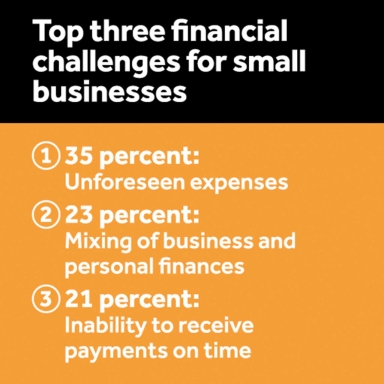Why your small business needs a budget

Depending on who you talk to, budgets for your small business are: a) a smart idea; b) a necessary evil; or c) retribution from the universe for every bad thing you’ve ever done.
We’re in the “smart idea” camp, but there’s no denying that creating and maintaining a budget can be a chore for a business owner—especially if you’re not convinced of its value in the first place. So, if you’re just starting your business and need a budget, or you’re a current owner who’s been putting off creating one, read on to see why a budget can be one of your small business’s most valuable tools.
“I keep up my checkbook. Why do I need a budget, too?”
In the excitement of launching a business, it’s easy to think you’ll work on a budget when you have time. Of course, time is in short supply for business owners, so you keep putting it off…and off.
Then come the slow periods when sales slump. Or clients take the “Net 30” notation on your invoice as a suggestion, not a deadline. Or you need to take on new expenses, like hiring a new employee or replacing equipment. Then, the realization kicks in: You don’t have enough money in the checkbook to cover those expenses, pay the bills or pay yourself a salary.
An accurate, up-to-date checkbook is certainly a vital tool for a business owner. However, a carefully crafted budget is what will help you get through the slumps, slow payment periods and unexpected expenses. Unlike checkbooks, which basically exist to show how money flows in and out of accounts, a budget:
Offers a financial roadmap for the future of your business
Details what your finances should be next week, next month or next year to meet obligations and be profitable
Helps you make smart financial decisions by providing a structure and plan for spending money in the right places and at the right time to keep you out of debt and grow revenue
Helps you estimate what you need in order to get through slow periods
Alerts you when expenses trend upward
Highlights leftover funds available to reinvest in the business
Indicates when you’re making enough money to pay yourself a salary and pay expenses
Offers a detailed account of your income and expenses to show prospective business lenders or investors
Keeps you in control of your business
When you don’t have a handle on your company’s cash flow, it can seriously hurt your business. A thoughtful and realistic budget is one of the best tools to stay on a healthy financial path.

Statistics (you knew we’d have some!)
According to the Bureau of Labor Statistics, about 20 percent of small businesses fail in the first year while approximately 50 percent fail about year five. According to a Clutch.co survey of 302 small business owners/managers, 61 percent of respondents didn’t create an official, formally documented budget in 2018.
While the latter statistic isn’t necessarily the reason for the former, the same survey showed that small businesses are more likely to skip making a budget—and that 37 percent of those businesses spent more than they budgeted in the first two quarters of 2018. So, it’s easy to see how the lack of a budget can spiral into a failed business if left unchecked.
The good news is that creating a budget doesn’t have to be complicated (we promise). As your financial advisor, we want you to be successful, so ask us about our free eBook on the steps for building a budget. Or, talk to us about how we can help you make an easy-to-follow budget based on your specific goals.
Back to issue












